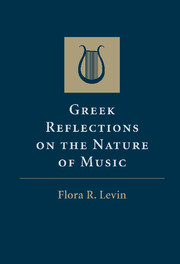Book contents
- Frontmatter
- Contents
- Figures
- Preface
- Introduction
- Abbreviations
- Texts
- 1 All Deep Things Are Song
- 2 We Are All Aristoxenians
- 3 The Discrete and the Continuous
- 4 Magnitudes and Multitudes
- 5 The Topology of Melody
- 6 Aristoxenus of Tarentum and Ptolemaïs of Cyrene
- 7 Aisthēsis and Logos: A Single Continent
- 8 The Infinite and the Infinitesimal
- ΣΦPAΓIΣ
- Bibliography
- Index
6 - Aristoxenus of Tarentum and Ptolemaïs of Cyrene
Published online by Cambridge University Press: 21 October 2009
- Frontmatter
- Contents
- Figures
- Preface
- Introduction
- Abbreviations
- Texts
- 1 All Deep Things Are Song
- 2 We Are All Aristoxenians
- 3 The Discrete and the Continuous
- 4 Magnitudes and Multitudes
- 5 The Topology of Melody
- 6 Aristoxenus of Tarentum and Ptolemaïs of Cyrene
- 7 Aisthēsis and Logos: A Single Continent
- 8 The Infinite and the Infinitesimal
- ΣΦPAΓIΣ
- Bibliography
- Index
Summary
Rara avis in terris
nigroque simillima cycno
Juvenal Satire 6. 165it has been maintained by scholars critical of his theory that Artistoxenus replaced the deductive and speculative method of the Pythagoreans with the empirical and experimental method of practicing musicians. But, as I argued in Chapter 5, this interpretation of Aristoxenus' accomplishments does not stand close scrutiny. For Aristoxenus' writings show clearly that there can be no empirical method for musicians without there first being speculative concepts and intuited forms of order. What also becomes apparent in Aristoxenus' theory is that there is no speculative thinking whose musical concepts do not reveal, on close examination, the empirical material from which they stem. Aristoxenus obtained this material by means of his ear (aisthēsis), by experiments with tunings, and by close observation of the conclusions he collected. He sought afterward the means to make these conclusions demonstrable.
Aristoxenus was bent on finding a correct standard for musicians. His goal was not simply to assert a higher ideal against Pythagorean theory; it was, rather, to vindicate the nature of music against the excessive demands of mathematics in Pythagorean harmonic theory. His own theory is not, therefore, as has been claimed, a slip-shod desertion of a traditional harmonic ordinance; it is, instead, a serious and systematic effort to impose an altogether new one. At the core of the matter is the presence of irrationality in mathematics: whereas the Pythagoreans tried endlessly to solve the problem of irrationality, Aristoxenus began by admitting its insolubility as a fact of musical life.
- Type
- Chapter
- Information
- Greek Reflections on the Nature of Music , pp. 204 - 240Publisher: Cambridge University PressPrint publication year: 2009

